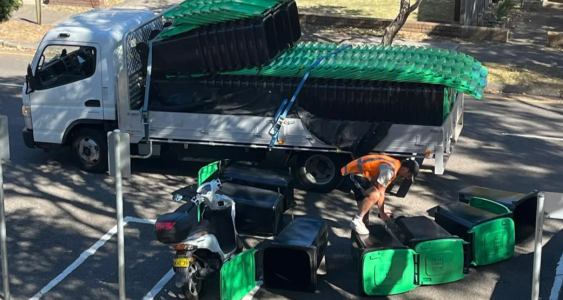Local citizens uncover a glaring mistake with the new garbage bin system – here's what you need to know before it affects you!
By
- Replies 13
In an era when environmental consciousness is more important than ever, Australia is taking strides to reduce its carbon footprint and manage waste more effectively. One initiative gaining traction across the nation is the introduction of the FOGO bin system, which stands for Food Organics and Garden Organics. The goal is to separate organic waste, such as food scraps and garden clippings, from other types of waste, thereby reducing the amount of material sent to landfills and instead turning it into compost.
However, as with any large-scale change, there are teething problems. Residents in the Bayside Council area of Sydney have recently voiced their concerns over what they consider a significant oversight in the rollout of the new system. The issue at hand? The distribution of green-lidded garden organics bins (GO) to apartment blocks and villas where there is little to no garden space to generate organic waste.
The frustration is palpable among those living in high-density housing, with some taking to social media to express their dismay. 'Green bins for a block of apartments with no green, just a concrete jungle. Sorry, asking for a ratepayer friend,' one resident posted, highlighting the absurdity of providing garden waste bins to those without gardens.
The sentiment is echoed by others who find the bins not only unnecessary but also a waste of space and resources. 'We have 8 villas and they gave us 8 bins. The amount of garden we all have combined we would be lucky to use 2 for the 8 of us,' another resident lamented. The question of where to store these bins is also a concern, as space is often at a premium in such living arrangements.
Thankfully, Bayside Council has offered a solution, allowing residents to 'opt-out' of the green bin service. Strata managers have been given the option to reduce the number of bins or eliminate them altogether by completing the relevant form. This opt-out option is also available to residents in non-strata buildings who do not require the green-lidded bin.
Despite this, some argue that the process of opting out is an unnecessary hassle and that the initial distribution of bins to unsuitable households is a 'waste of time, money and resources.' It's clear that while the intentions behind the FOGO system are commendable, the execution has been less than perfect.
The FOGO bin change has proven divisive across Australia, with mixed reactions from the public. While some residents are thrilled with the new system, others are concerned about issues such as increased flies, odours, and the potential cost of future services. In Bundaberg, for instance, the FOGO system was reversed after a trial period due to resident backlash.
Moreover, the scaling back of general waste removal services to accommodate the FOGO bins has led to complaints of overflowing rubbish in some areas, such as Bassendean, Western Australia, where a petition was launched to reinstate weekly general waste collections.
As we navigate these changes, it's crucial for local councils to listen to the feedback of their residents and adapt their strategies accordingly. The goal of reducing organic waste in landfills is a noble one, but it must be balanced with practical considerations for the diverse living situations of all Australians.
For our senior community members, staying informed about these changes and understanding your rights when it comes to waste management is essential. If you find yourself with a new bin that doesn't suit your needs, don't hesitate to contact your local council to discuss your options.
 We'd love to hear from you, our readers, about your experiences with the new FOGO bin system. Have you found it beneficial, or has it caused more problems than it's solved? Share your stories in the comments below, and let's navigate these green changes together.
We'd love to hear from you, our readers, about your experiences with the new FOGO bin system. Have you found it beneficial, or has it caused more problems than it's solved? Share your stories in the comments below, and let's navigate these green changes together.
However, as with any large-scale change, there are teething problems. Residents in the Bayside Council area of Sydney have recently voiced their concerns over what they consider a significant oversight in the rollout of the new system. The issue at hand? The distribution of green-lidded garden organics bins (GO) to apartment blocks and villas where there is little to no garden space to generate organic waste.
The frustration is palpable among those living in high-density housing, with some taking to social media to express their dismay. 'Green bins for a block of apartments with no green, just a concrete jungle. Sorry, asking for a ratepayer friend,' one resident posted, highlighting the absurdity of providing garden waste bins to those without gardens.
The sentiment is echoed by others who find the bins not only unnecessary but also a waste of space and resources. 'We have 8 villas and they gave us 8 bins. The amount of garden we all have combined we would be lucky to use 2 for the 8 of us,' another resident lamented. The question of where to store these bins is also a concern, as space is often at a premium in such living arrangements.
Thankfully, Bayside Council has offered a solution, allowing residents to 'opt-out' of the green bin service. Strata managers have been given the option to reduce the number of bins or eliminate them altogether by completing the relevant form. This opt-out option is also available to residents in non-strata buildings who do not require the green-lidded bin.
Despite this, some argue that the process of opting out is an unnecessary hassle and that the initial distribution of bins to unsuitable households is a 'waste of time, money and resources.' It's clear that while the intentions behind the FOGO system are commendable, the execution has been less than perfect.
The FOGO bin change has proven divisive across Australia, with mixed reactions from the public. While some residents are thrilled with the new system, others are concerned about issues such as increased flies, odours, and the potential cost of future services. In Bundaberg, for instance, the FOGO system was reversed after a trial period due to resident backlash.
Moreover, the scaling back of general waste removal services to accommodate the FOGO bins has led to complaints of overflowing rubbish in some areas, such as Bassendean, Western Australia, where a petition was launched to reinstate weekly general waste collections.
As we navigate these changes, it's crucial for local councils to listen to the feedback of their residents and adapt their strategies accordingly. The goal of reducing organic waste in landfills is a noble one, but it must be balanced with practical considerations for the diverse living situations of all Australians.
For our senior community members, staying informed about these changes and understanding your rights when it comes to waste management is essential. If you find yourself with a new bin that doesn't suit your needs, don't hesitate to contact your local council to discuss your options.
Key Takeaways
- Bayside Council area residents have criticised the rollout of new green-lidded garden organics bins for being unsuitable in areas with minimal garden space, such as apartment buildings.
- Residents in strata buildings and non-strata homes can opt out of the green bin service or request a reduced number of bins from the council.
- While some residents appreciate the new green bins and see them as beneficial, others view them as a waste of time, money, and resources, particularly when they are delivered to properties without garden waste.
- The national push for the FOGO bin system to reduce organic waste in landfills by 2030 has led to a divided response, with some areas experiencing issues such as increased flies, odours, and concerns over waste management frequency and extra costs.








